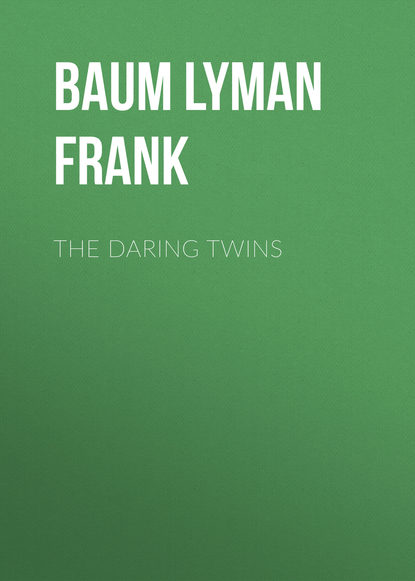По всем вопросам обращайтесь на: info@litportal.ru
(©) 2003-2024.
✖
The Daring Twins
Настройки чтения
Размер шрифта
Высота строк
Поля
Phil paused with his hand on the knob of the door. To leave the office at this juncture would be humiliating and unsatisfactory. His nature was usually calm and repressed, and under excitement he had a way of growing more quiet and thinking more clearly, which is exactly the opposite of the usual formula with boys of his age. His strong resentment at the frank speech of the old lawyer did not abate, but he began to reason that a quarrel would be foolish, and if he intended to satisfy the doubts that worried him he must ignore the slight cast upon his character.
He laid down his hat and resumed his chair.
“After all, sir,” he said, “I’m the eldest boy and the head of the family. It is my duty to find out how we stand in the world, and what is necessary to be done to protect and care for my brother and sisters.”
“True enough, my lad,” rejoined the lawyer, in a hearty tone. “I’ll help you all I can, Phil, for your father’s sake.”
“You administered the estate,” said the boy, “and you are still my guardian, I believe.”
“Yes. Your father left no will, and the court appointed me administrator and guardian. I’ve done the best I could to untangle the snarl Wallace Daring left his business in, and the affairs of the estate are now closed and the administrator discharged.”
“Was – was there anything left?” inquired Phil, anxiously.
“Your father was a wonderful man, Phil,” resumed the lawyer, with calm deliberation, “and no doubt he made a lot of money in his day. But he had one fault as a financier – he was too conscientious. I knew Wallace Daring intimately, from the time he came to this town twenty years ago, and he never was guilty of a crooked or dishonest act.”
Phil’s face brightened at this praise of his father and he straightened up and returned the lawyer’s look with interest.
“Then there was nothing disgraceful in his failure, sir?”
“No hint of disgrace,” was the positive reply. “Daring made a fortune from his sugar factory, and made it honestly. But three years ago all the beet sugar industries of the country pooled their interests – formed a trust, in other words – and invited your father to join them. He refused, believing such a trust unjust and morally unlawful. They threatened him, but still he held out, claiming this to be a free country wherein every man has the right to conduct his business as he pleases. I told him he was a fool; but I liked his sterling honesty.
“The opposition determined to ruin him, and finally succeeded. Mind you, Phil, I don’t say Wallace Daring wouldn’t have won the fight had he lived, for he was in the right and had a host of friends to back him up; but his accidental death left his affairs in chaos. I had hard work, as administrator, to make the assets meet the indebtedness. By selling the sugar factory to the trust at a big figure and disposing of your old home quite advantageously, I managed to clear up the estate and get my discharge from the courts. But the surplus, I confess, was practically nothing.”
Phil’s heart sank. He thought earnestly over this statement for a time.
“We – we’re pretty poor, then, I take it, sir?”
“Pretty poor, Phil. And it’s hard to be poor, after having enjoyed plenty.”
“I can’t see that there’s any college career ahead of me, Mr. Ferguson,” said the boy, trying to keep back the tears that rushed unbidden to his eyes.
“Nor I, Phil. College is a fine thing for a young fellow, but under some circumstances work is better.”
“Why didn’t you tell me this before, then?” demanded the boy, indignantly.
“There was no use in discouraging you, or interrupting your work at high school. I consider it is best for you to graduate there, especially as that is liable to end your scholastic education. The time is so near – less than three months – that to continue your studies would make little difference in deciding your future, and the diploma will be valuable to you.”
No one but Phil will ever know what a terrible disappointment he now faced. For years his ambition, fostered by his father, had been to attend college. All his boyish dreams had centered around making a record there. Phil was a student, but not one of the self-engrossed, namby-pamby kind. He was an athlete as well as a scholar, and led his high school class in all manly sports. At college he had determined to excel, both as a student and an athlete, and never had he dreamed, until now, that a college career would be denied him.
It took him a few minutes to crowd this intense disappointment into a far corner of his heart and resume the conversation. The lawyer silently watched him, his keen gray eyes noting every expression that flitted over the boy’s mobile features. Finally, Phil asked:
“Would you mind telling me just how much money was left, Mr. Ferguson?”
“The court costs in such cases are extremely high,” was the evasive reply. The lawyer did not seem to wish to be explicit, yet Phil felt he had the right to know.
“And there were your own fees to come out of it,” he suggested.
“My fees? I didn’t exact any, my lad. Your father was the best and truest friend I ever had. I am glad I could do something to assist his orphaned children. And, to be frank with you, Phil, I couldn’t have squared the debts and collected legal fees at the same time, if I’d wanted to.”
“I see,” returned Phil, sadly. “You have been very kind, Mr. Ferguson, and we are all grateful to you, I assure you. But will you please tell me how we have managed to live for the past eight months, since there was nothing left from father’s estate?”
It was the lawyer’s turn to look embarrassed then. He rubbed his hooked nose with one finger and ran the other hand through the thick mat of white hair.
“Wallace Daring’s children,” said he, “had trouble enough, poor things, without my adding to it just then. I’ve a high respect for old black Hyacinth, Phil. The faithful soul would die for any one of you, if need be. She belongs to the Daring tribe, mind you; not to the Eliots. Your father brought her here when he was first married, and I think she nursed him when he was a baby, as she has all his children. So I took Aunt Hyacinth into my confidence, and let her manage the household finances. A month ago, when the final settlement of the estate was made, I turned over to her all the surplus. That’s what you’ve been living on, I suppose.”
“How much was it?” asked the boy, bent on running down the fact.
“Forty dollars.”
“Forty dollars! For all our expenses! Why, that won’t last us till I graduate – till I can work and earn more.”
“Perhaps not,” agreed the attorney, drily.
Phil stared at him.
“What ought I to do, sir? Quit school at once?”
“No. Don’t do that. Get your diploma. You’ll regret it in after life if you don’t.”
“But – there are five of us, sir. The youngsters are hearty eaters, you know; and the girls must have clothes and things. Forty dollars! Why, it must have all been spent long ago – and more.”
Mr. Ferguson said nothing to this. He was watching Phil’s face again.
“It’s all so – so – sudden, sir; and so unexpected. I – I – ” he choked down a sob and continued bravely: “I’m not able to think clearly yet.”
“Take your time,” advised the lawyer. “There’s no rush. And don’t get discouraged, Phil. Remember, you’re the head of the family. Remember, there’s no earthly battle that can’t be won by a brave and steadfast heart. Think it all over at your leisure, and consider what your father might have done, had some whim of fortune placed him in your position. Confide in Phœbe, if you like, but don’t worry the little ones. Keep a stiff upper lip with your friends and playmates, and never let them suspect you’re in trouble. The world looks with contempt on a fellow who shows he’s downed. If he doesn’t show it, he isn’t downed. Just bear that in mind, Phil. And now run along, for I’ve a case to try in half an hour, at the courthouse. If you need any help or advice, lad,” he added, with gentle kindliness, “come to me. I was your father’s friend, and I’m your legal guardian.”
Phil went away staggering like a man in a dream. His brain seemed in a whirl, and somehow he couldn’t control it and make it think logically. As he reached the sidewalk Al Hayden and Eric Spaythe ran up to him.
“We’ve been waiting for you, Phil,” said one. “Saw you go up to the judge’s office.”
“Let’s hurry over to the practice field,” suggested the other, eagerly. “The rest of our nine is there by this time, and we’ve got to get in trim for the match this afternoon.”
Phil stared, first at one face and then the other, trying to understand what they were talking about.
“If we’re beaten by Exeter to-day,” continued Al, “we’ll lose the series; but we won’t let ’em beat us, Phil. Their pitcher can’t hold a candle to you, and we’ve got Eric for shortstop.”
“How’s your arm, Phil?” demanded Eric.
They had started down the street as they talked, and Phil walked with them. Gradually, the mist began to fade from his mind and he came back to the practical things of life. “If a fellow doesn’t show it, he isn’t downed,” the shrewd old lawyer had said, and Phil knew it was true.
“My arm?” he replied, with a return of his usual quiet, confident manner; “it’s fit as anything, boys. We’ll beat Exeter to-day as sure as my name’s Phil Daring.”
CHAPTER III
BECKY GETS ACQUAINTED
Meantime Becky, Donald and Sue had maintained their interest in the new neighbors, and partly concealed by the vines that covered the porch were able to watch every movement across the way.

















